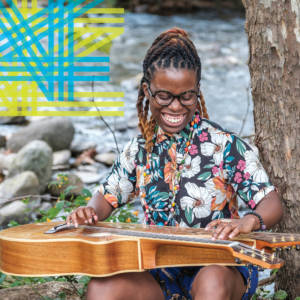Yasmin Williams – Fingerstyle Guitar – The Block
Yasmin Williams is one of the country’s most imaginative young solo guitarists. Untethered to any one tradition, her unique fingerstyle technique blends folk, blues, and ambient elements, taking audiences on a spellbinding musical journey.
“Williams, 25, is one of the country’s most imaginative young solo guitarists.”
– The New York Times
LINKS
• Read Yasmin William’s bio
• Watch video/test drive the experience
• Check out Yasmin’s social accounts: Facebook & Instagram
Subscribers get the best seats, at the best price.
Learn more here.
This concert is part of the following packages:
Premier (12 concerts), Unplugged (6 concerts), Unplugged Plus (7 concerts)
When guitarist and composer Yasmin Williams sits down to compose music, she doesn’t scour her subconscious for unheard melodies or clever chord progressions. Instead, she goes granular—fixating on a single note. She’ll play it over and over, sustaining it, varying the attack or the release to change its essence, eventually adding notes to form chords.
She has a name for this. She calls it “ruminating” and describes it as a key part of her writing. “I’ve learned a little about how to sit with a note, and to give things time,” the Virginia native says. “You find some tiny idea and just play it over and over again until something else pops up … You have to trust that sometimes a note will take you to where it wants to go next.”
This intuitive process led Williams to the breathtakingly tactile and rivetingly understated Acadia, her Nonesuch debut. Its nine original songs expand, dramatically, on the sonic space Williams created with her acclaimed 2021 album, Urban Driftwood. In addition to the crisp fingerpicked guitar that helped establish her as a fast-rising star of instrumental folk, Williams plays kora, harp guitar, banjo, and electric guitar and bass—all with authority. And where her two previous records have been mostly solo, Acadia finds Williams collaborating with artists across a wide stylistic range, including the vocalist Aoife O’Donovan, violinist Darian Donovan Thomas, the folk quartet Darlingside, synthesist Rich Ruth, and jazz alto saxophonist Immanuel Wilkins.
Williams needed these ninjas to help her execute the simultaneously detailed and open-ended music she envisioned. Though her Acadia songs evoke sloping hills and rustic ambles, they’re not folksy folk: Many are structured as complex suites and are notable for sudden shifts of mood, spontaneous re-harmonizations, and the extended mounting- tension ramp-ups common in progressive rock. Williams organized Acadia in three sections: The opening set of songs evokes the wily exuberance of old-time music, then gently stretches its conventions; the second explores lush, layered textures and zones of vast atmospheric ambience; the third, which introduces electric guitar(s) and drums, has an experimental, improvisational spirit. She wrote the songs while touring, and that’s audible: This music has a breathless, world-in-motion sweep to it. It’s alive with wanderlust—specifically, that elevated-awareness feeling of journeying when you don’t know exactly where you’re going.
That openness is something Williams says she longed for during the extended Urban Driftwood tour. “I used to really love the verse-chorus-bridge structures of folk songs,” Williams says. “A lot of my earlier music is organized that way, which I call ‘quick tunes’ and I still love playing.” After doing that a lot, she says, she longed for a more experimental ethos. She’s grown “more comfortable with letting things stretch out. I don’t feel like I need to maintain absolute control over the structure. For me, music is now more about flexibility than it ever has been before.”
That could be an unexpected side benefit from the touring she’s done since 2021: The road throws surprises at every turn, and how an artist responds can be telling. Williams mentions working on a new song the night before her first performance at the Newport Folk Festival. She didn’t finish the song, which is called “Cliffwalk,” but on the golfcart ride to the stage psyched herself up to perform it anyway; she’s since worked her improvisation from that day into the arrangement.
Williams has similar stories of spontaneous serendipity about nearly every Acadia track. She mentions “Harvest,” which was conceived as a duet with the pathfinding acoustic guitarist Kaki King. Listening back to the final take, Williams kept hearing another sound, particularly in the middle section where harmonic artifacts from the two guitars intertwine in haunting ways. She invited the violinist Darian Donovan Thomas to the studio and shared her idea; literally twenty minutes later, Williams recalls, “Harvest” was transformed, its middle section blossoming into a divinely inspired array of overlapping halo tones. “He figured out the world of that tune really quickly, and just lived in that world.”
Williams’ calm, gorgeously consonant music inspires this type of alchemy. Songs like “Sisters” and “Virga” seem to float across scenery in suspended animation, as though propelled by placid mountain breezes. These pieces are centered around long-held consonant tones; they could easily have grown from those single-note explorations Williams uses as a composition prompt.
“My fourteen-or fifteen-year-old brain told me: ‘We should let the notes ring out for as long as possible as often as we can,’” Williams says about her penchant for grand sustained guitar sounds. In high school, she played guitar for five or six hours a day—more time than she devoted to her first instrument, the clarinet—and much of that was spent exploring ways to massage and sustain tone. “It just sounded better to me to do that,” Williams says. “Still does. It requires a lot of practice, getting hands in the right place … But I love when notes ring out. I love it when notes have time to develop, in my music and the music I listen to.”
Williams doubts that listeners would notice if she one day stopped letting her notes ring out. But it matters to her. And her attention to such a small element of music reveals something essential about Yasmin Williams: She might seem to be way up in the upper atmosphere conjuring ethereal sounds, but at the same time she’s in the engine room, tweaking the small details of performance, using often-overlooked elements of craft to underscore and amplify her compositions.
There are only so many ways for fingers to engage with the strings of a guitar, and most of them are evident on Acadia: Williams pounds the strings, conjures dense chords with a shredder’s lust for dissonance, dances through intricate scampering leads (“Dream Lake”), chops out syncopated patterns with mechanistic precision, arpeggiates with a feathery grace. And then, when it’s time to pare things back to an essence, she’ll lean into a note and hold it for a good long while, to see what it has to offer.
“I was taught to be picky about stuff like articulation,” Williams says with a laugh. “I guess I learned it. Honestly, this is the stuff that’s really important to me—the little things. They might go over people’s heads a little bit. They go over my head sometimes. That’s OK, because they become part of the songs.”
**
Yasmin Williams grew up in the Northern Virginia town of Woodbridge in a family with a deep reverence for music. They’d harmonize together on car rides, with Yasmin handling the highest parts. She recalls listening to a wide range of artists, including Chuck Brown, the pioneer of Washington, DC’s go-go sound. She describes herself as an ordinary rock kid (favorites: Jimi Hendrix, Nirvana) in high school; her listening broadened while earning a degree in music theory and composition at NYU. It was there that she began to explore nontraditional approaches to the acoustic guitar, developing a fingerstyle technique with the instrument resting on her lap. She’s recorded two previous albums—her debut Unwind (2018) and Urban Driftwood (2021)—and used each to expand her array of sound tools and techniques: She sometimes positions her kalimba, the African thumb piano, atop the guitar so she can play both at once. She also plays kora, harp guitar, doubleneck guitar, banjo, and percussion instruments.
Though many of those instruments are prevalent in folk and oldtime music, Williams doesn’t regard herself as a folk musician. “I don’t subscribe to the folk idiom,” Williams says. “It’s not like I listened to folk as a teenager. I feel folk music now is very much in a corner. It doesn’t allow itself to … accept new influences. It promotes conformity in some aspects, and to me that’s the opposite of what folk music is about.”
— Biography written by Tom Moon

Yasmin Williams – Fingerstyle Guitar – The Block
The Block
About
Yasmin Williams is one of the country’s most imaginative young solo guitarists. Untethered to any one tradition, her unique fingerstyle technique blends folk, blues, and ambient elements, taking audiences on a spellbinding musical journey.
“Williams, 25, is one of the country’s most imaginative young solo guitarists.”
– The New York Times
LINKS
• Read Yasmin William’s bio
• Watch video/test drive the experience
• Check out Yasmin’s social accounts: Facebook & Instagram
Subscribers get the best seats, at the best price.
Learn more here.
This concert is part of the following packages:
Premier (12 concerts), Unplugged (6 concerts), Unplugged Plus (7 concerts)

